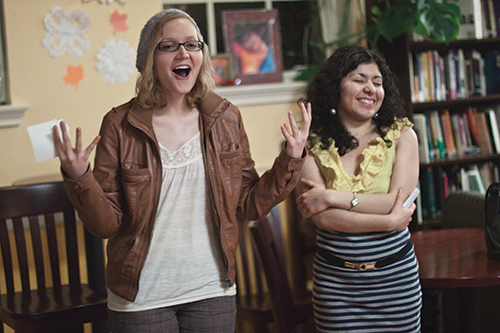What originally began as a dialogue between friends about relationships with men, women and each other transformed into a global initiative for open discussion of violence against women that ultimately empowered them to improve their situations.
From the stage to a global movement

What originally began as a dialogue between friends about relationships with men, women and each other transformed into a global initiative for open discussion of violence against women that ultimately empowered them to improve their situations.
Eve Ensler created hundreds of fictional monologues based on women’s experiences that ultimately became The Vagina Monologues, which the Portland State’s Women’s Resource Center is presenting this weekend at Lincoln Hall.
Ensler first performed The Vagina Monologues in 1996, totally unaware of the impact the play would still have nearly 20 years later. The play spawned V-Day, a celebration of women with the goal of raising awareness about the magnitude of sexual violence committed against them.
Last year, more than 5,800 V-Day events were held worldwide. Alongside V-Day is the One Billion Rising campaign, a call for a global strike for women and men to get up and demand an end to the violence.
As it has been for the past 10 years at PSU, this year’s take on The Vagina Monologues was produced by a small group of dedicated volunteers from the Women’s Resource Center.
For those who don’t know, the center is nestled beneath the Simon Benson House, nearly invisible under the ivy, in a basement office. The center offers drop-in counseling, support and an overall place of peace for women on campus.
Jessica Amo, director of the center, is passionate about the opportunity “to provide students [with] a dialogue,” especially when it comes to sexual violence.
“It’s student-run and produced,” Amo said of Monologues. “It’s a student leadership opportunity. These students have been meeting since fall. They volunteer their time on top of work and school.”
Fifth-year student Whitney Jacobson, the producer of this year’s event, is one such person. The double major in theater and communications has been busy calling different businesses and nonprofits, asking for their support.
“The last few weeks [before the production] are the most hectic and worrisome,” she said. “I’m thinking, ‘What if I don’t have enough raffle donations? What if I don’t get enough people to participate in the bake sale?’ I think if I’d known how much work there was, I would have gotten myself an assistant or two,” Jacobson joked.
This will be Jacobson’s third Monologues performance with the center, and each year has been a little bit different.
“Every year the monologue’s focus shifts. Some years are really focused on the message of the play, sometimes having fun and making a celebration of women, and some years [the] focus is on the violence,” Jacobson said.
What hasn’t changed for the center is the community support.
“Some years there were 800 people who attended,” Jacobson said, noting that last year was one of them. “This year, one of our monologues is copresented in English and Spanish. I would love to see more of that. I want to make them as accessible as possible.”
The center has put on a production of The Vagina Monologues every year since 2003. This year, Amo said, there is an “engaging, ongoing conversation about sexual violence and the tie into services provided on campus.”
The Vagina Monologues
Saturday, Feb. 15, and Sunday, Feb. 16, at 7 p.m.
Smith Memorial Student Union ballroom
General admission: $12
Students: $10
The V-Day Foundation provides materials and guidance to empower community groups to put on productions of The Vagina Monologues and the documentaries Until the Violence Stops and What I Want My Words to Do to You.
Amo said that while she and the center support the V-Day global initiative, she stressed that “The Vagina Monologues does not cover every survivor’s experience.”
Senior liberal studies major Corin Garratt is a member of the company who will perform a monologue about a 70-year-old New Yorker who’s “a hoot.”
“I attended the last two years and had friends who went,” Garratt said of her beginnings with Monologues. “I felt empowered, and since I’ve been getting involved in women’s studies, I’ve been wanting to act on this lifestyle.”
It’s clear to anyone who walks through the doors of the center or attends the opening of The Vagina Monologues that all of the women involved are beyond passionate—not only about the production but about its global mission.
“This year is the 15th anniversary…It’s a monumental time to make a change,” Garratt said. “With the election, there [is] lots of discussion on women’s rights. It’s time to take leaps forward.”






